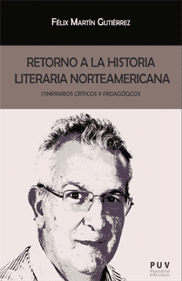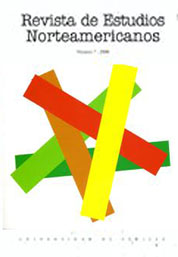Welcome to SAAS
Call for Papers website provided by the Department of English at the University of Pennsylvania
Ana Manzanas & Jesús Benito, Cities, Borders and Spaces in Intercultural American Literature and Film

Félix Martín Gutiérrez, Retorno a la historia literaria norteamericana: itinerarios críticos y pedagógicos, PUV, 2014

REN: Revista de Estudios Norteamericanos

Call For Papers for Our Next Conference
"A Return to (What Never Was) Normal: Discourses of (Ab)Normalcy in US Culture, Literature, Arts, and Politics; Past, Present, and Futures"
PANEL 11
11) "Normalized Assumptions about Inequality and Precarity in Contemporary US Fiction"
Panel Chair: Virginia Pignagnoli, Laura Roldán-Sevillano, Universidad de Zaragoza
E-mails: vpignagnoli@unizar.es, iroldan@unizar.es
As happens with oppressive forms of domination (e.g., racism, sexism), the precarious workforces present in US education system, healthcare, urban planning, migration, and work-family policies, "do not come into being magically or naturally" (Ferguson 2020, 118). Since the 2008 financial crisis, in fact, precarity has increased in a world where "relatively unstable and dispersed conditions of deprivation and insecurity" gained ground (During 2015). And yet, today's economic and social precarity in the US also relates to what Lauren Berlant defines as the "cruel optimism" (2011, 1) of the "fantasy of the American Dream," which has always promised the chimera of a life of dignity in terms of socio-economic conditions "if you invest your energies in work and family-making" (1997, 4).
This panel seeks articles investigating how 21st century US fiction represents the diverse forms and experiences of precarity in American society, from insecurity, uncertainty, and unsafety to disposability, and trauma. In particular, this panel invites essays that formally analyze narratives responding to normalized assumptions about social, economic, and labor imbalances, and their intersectional relation with gender, race, and class. While US fiction has often captured the ways in which humans relate to work and inequality, in the last few years there has been a resurgence of the political novel (Irr 2014) and, more generally, of novels that "earnestly engage with the moral, ethical and political issues affecting contemporary society" (Alber and Bell 2019, 124). In assessing textual representations of precarity, this panel aims at reflecting on current ethical and political discourses which engender situations of instability and marginality, and to identify ways of resistance, resilience, and healing by those facing the cruel optimism of the fallacious myth of the American Dream. Proposals may draw, among other studies, on theorizations and framings of precarity such as Judith Butler's (2009), on intersectional discrimination (Crenshaw 1989, 1991), color-blind racism (Bonilla-Silva 2003), and/or on decolonizing perspectives in line with "imperial precariousness" (Danewid 2017), and recent revisions of trauma (Craps 2013; Visser 2015).
GUIDELINES FOR PARTICIPANTS
Abstracts of Proposals are to be e-mailed directly to the chair of the selected panel using this form. The deadline for submitting abstracts is October 15, 2022. Panel chairs are expected to accept/reject proposals and have panels set up by November 7.
Non-members of SAAS (of all nationalities) are welcome to participate in the conference, but will be required to pay membership dues for one year as well as the conference registration fee. Members of ASA (American Studies Association), AISNA (Associazione Italiana di Studi Nor-Americani), APEAA (Portuguese Association for Anglo-American Studies) and HELAAS (Hellenic Association for American Studies) need only pay the conference registration fee.
Further guideliness for participants can be found here.








